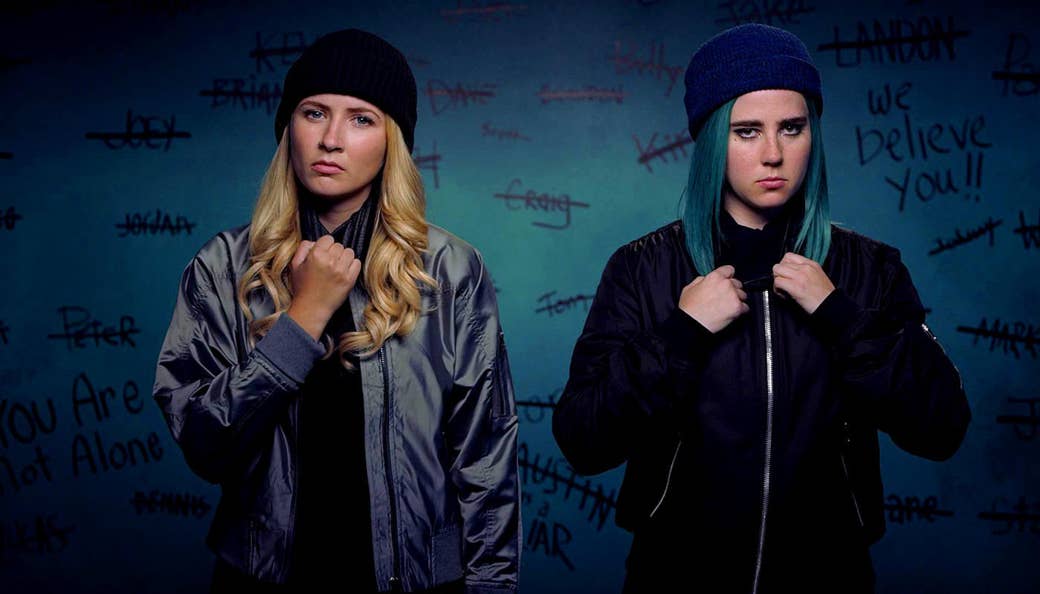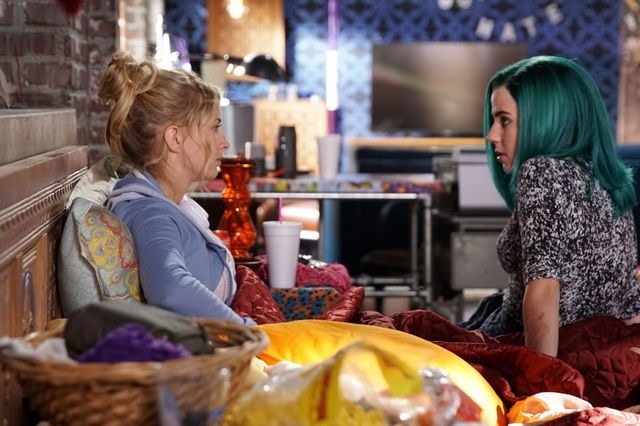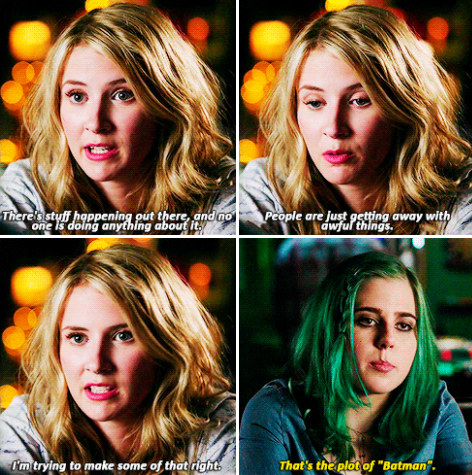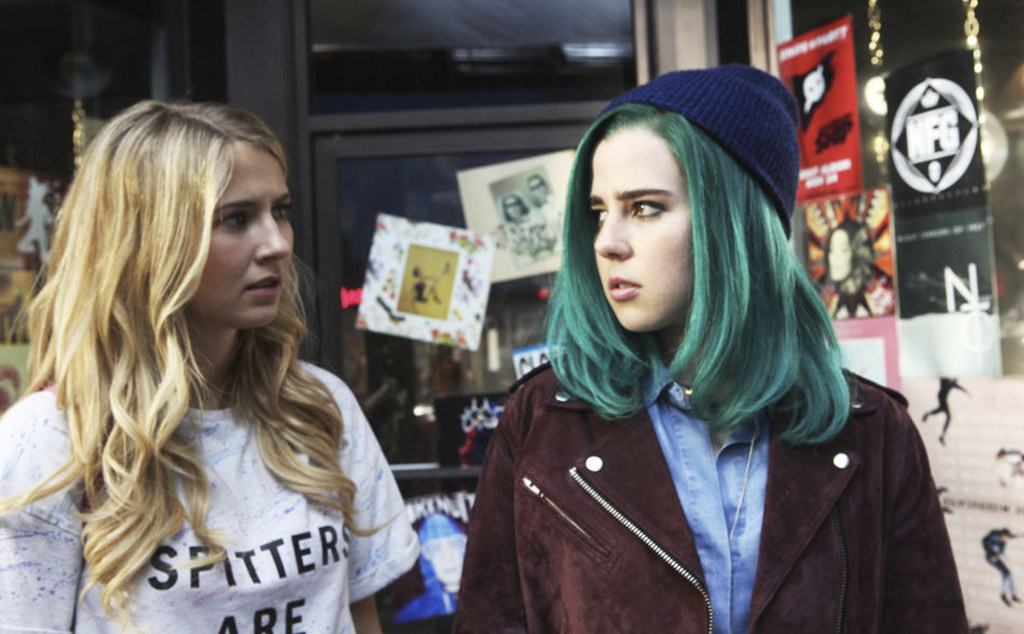
In the first episode of MTV’s Sweet/Vicious, sorority girl Jules (Eliza Bennett) and hacker Ophelia (Taylor Dearden) accidentally kill a man. As the near strangers sit together in Ophelia’s car afterward, “Defying Gravity” comes on the radio. The Wicked classic kicks into gear and the young women are bonded as they sing along with all they’ve got, Elphaba's words an eerily perfect fit to the situation and the show as a whole:
“Something has changed within me / Something is not the same / I’m through with playing by the rules of someone else’s game.”
It’s an auspicious start to any show looking to combine the darkly humorous comic book panache of a vigilante story with the sort of millennial sensibility that leads to a Broadway musical sing-along about murder. But Sweet/Vicious pulls it off. It pulls off a lot, actually, thanks to its heightened reality that takes audiences through the lives of two students who’ve teamed up to fight perpetrators of sexual assault on the fictional Darlington University campus. One part superhero drama, one part friendship comedy, three parts survivor narrative, Sweet/Vicious has been walking a tightrope of high stakes since its November premiere — and it's done so masterfully.
Full of saturated colors, action scenes, and witty repartee, Sweet/Vicious is very much a successor to Jessica Jones and Veronica Mars, two other series that managed to be punchy and witty while dealing head-on with the long-term emotional consequences of rape. It’s also, through no accident, currently TV’s most attentive portrayal of sexual assault and the culture it breeds. Because while the trappings may be comic-book magnified, the very core of the show is grounded in an experience that’s all too familiar. According to RAINN — the Rape, Abuse, and Incest National Network, which partnered with Sweet/Vicious — someone is sexually assaulted in the United States every 98 seconds. The stories Sweet/Vicious tells are ones we’ve heard before...from the people around us, from our own histories, and from an unrelenting daily news cycle.
“We’ve all seen other shows that cover this issue, and it was very important to us that it was not sensationalized, that it honored what survivors have gone through,” showrunner Amanda Lasher told BuzzFeed News in a recent phone interview.
"If this was a show that felt like clickbait, it would be terrible, the worst show on television.”
Shows like Game of Thrones have fallen into the ever-growing crater of series accused of using rape stories as a shortcut to character development or titillation. “We needed to talk about, ‘What are things we’ve seen that we don’t like? What are things we’ve seen that we like?’" Sweet/Vicious creator Jennifer Kaytin Robinson told BuzzFeed News in a phone interview. "We didn’t want to shy away from what is happening, but we didn’t want to exploit it. We never wanted it to feel like we were being greedy with this epidemic.”
“We didn’t want it to feel like we were just doing things for the sake of doing it because ‘Ooh, this will be buzzy, people will write about this.’ We didn’t want it to feel like clickbait,” Robinson added. “If this was a show that felt like clickbait, it would be terrible, the worst show on television.”
While other series have portrayed, in bits and pieces, many of the plots Sweet/Vicious tackles — assaults committed by friends and strangers; the traumas both of the attack itself and everything that comes afterward; the experiences of getting a rape kit, of seeking help or feeling unable to, of telling your friends, and of navigating who will believe you and whether or not to report it — few, if any, have confronted them with such a high volume of examples. And even fewer have approached these issues with as much attention to detail from the get-to.

That's all because Lasher and Robinson did their homework. As they prepared to plot out the series, every single morning, their assistant would pull any news she could find about sexual assault, "from any point of view," Lasher said. Then, they'd start their day reading through a stack of articles about rape. "It was incredibly scary how many articles were being written daily about this, that were not even getting the attention they deserved, that weren’t even mainstream," Robinson said. "And they were horrifying to read.”
“You want to talk about 'binders full of women,' there were so many stories,” Lasher added.
Their reading material included We Believe You, by Annie E. Clark and Andrea L. Pino, and Missoula, by Jon Krakauer. They listened to podcasts and watched The Hunting Ground, the critically acclaimed 2015 documentary about the destruction sexual assault on college campuses causes both personally and systemically. They spoke with a representative from RAINN and a coordinator for Title IX, the federal law that prohibits discrimination based on sex in education. They also spoke with an officer from a big college and with survivors in their own lives and online. “We just reached out in every direction that we could,” Lasher said.
“We tried to tell this story as objectively as we could,” said Robinson. “It really is an amalgamation of all the research that we did, but we really did learn something new every day. Even as we were filming, the Stanford letter came out,” she added, referring to the moment in June 2016 that BuzzFeed published the devastating letter a woman read aloud in court to Brock Allen Turner, the man who sexually assaulted her on the Stanford University campus and who’d been sentenced to only six months in prison. (He served only three months before being released.)

With their research in mind, the Sweet/Vicious creators continued to establish their story and characters. Lasher and Robinson fleshed out as many different scenarios surrounding sexual assault on college campuses as they could reasonably fit into one season. Every episode of Sweet/Vicious explores a different case of sexual assault that Jules and Ophelia try to avenge, finding their targets through campus rumors and a communal wall in one of the women’s bathrooms, where people anonymously name their attackers as a means of warning others. The very first scene of the series sees Jules break into a fraternity house, clad in black and wearing a mask. “You didn’t stop when she said no, did you, Will?” she says as she slams one man to the ground. “If you ever do to anyone else what you did to Beth, I will be back.”
But ultimately, Lasher and Robinson doubled down on grounding the series in the budding friendship between Ophelia and Jules — who are brought together when Ophelia joins Jules’ fight against the behemoth of rape on their campus — and deepened by their opposites-attract buddy dynamic that channels Thelma and Louise. They paid extra attention to the journey of Jules, whose story includes, but is not limited to, her struggle to heal in the wake of her own assault.
“We wanted to be realistic about what [sexual assault] looks like, and that was very important to us.”
Raped by her best friend’s boyfriend — a popular campus athlete and a man she used to count as a friend — Jules’ narrative throughout the first season is as complex and layered as the things she’s feeling. She makes progress in her healing, and she backslides. She fights, and yet she hides. She builds friendships, and she grapples with the fact that some are changed forever. She confronts her rapist, but it takes her most of the season to add him to her list of targets.
And in the show’s seventh episode, Sweet/Vicious flashes back to her assault and the time immediately surrounding it. “We did want to show what it looks like, and how gutting that is — and how it isn’t like you’ve seen before on television, where you’re knocked out in an alley by a stranger, and it’s the middle of the night, and whatever’s been shown before on procedurals and Law & Order,” Robinson said. “We wanted to be realistic about what it looks like, and that was very important to us.”
The show’s writers and producers thought deeply about how to approach the flashback scene, with Robinson writing about the process in a piece for MTV when the episode aired. “I felt the weight of what I wanted to show,” she wrote, “of what I wanted to convey in this 41-page/41-minute episode of television. ... How do I write this without it feeling exploitative?”
“It just was, again, ‘What would serve the story? What was appropriate to that particular story?’” Lasher told BuzzFeed News. “Across the board, we never wanted to do anything that felt sensationalized.”

Lasher and Robinson have been constantly aware of the responsibility they've assumed by centering a show on an issue so tragic and relevant to daily life. “We have always felt that this was a show that we were making for the survivors,” Lasher said. “And from day one, we’ve really carried that responsibility close to our hearts.”
Sexual assault has never not been timely, but Sweet/Vicious premiered only a week after the election of Donald Trump, a man accused by multiple women of sexual assault and who bragged about grabbing women “by the pussy” without consent. The season’s finale airs on Jan. 24, just a few days after his inauguration. “This country has such a ‘protect our boys’ mentality, and it’s happening with Trump,” Robinson said in an interview with Glamour in November.
“I just want to do everything I can to make sure that this cause is heard, and that survivors are heard,” Robinson told BuzzFeed News, a week and a half before she participated in the Women's March. “So when I think of all this weight on my shoulders, I’m happy to pile it on if I can bring this story to people.”
CORRECTION
Brock Turner was convicted of sexual assault. An earlier version of this post indicated he was found guilty of rape.
